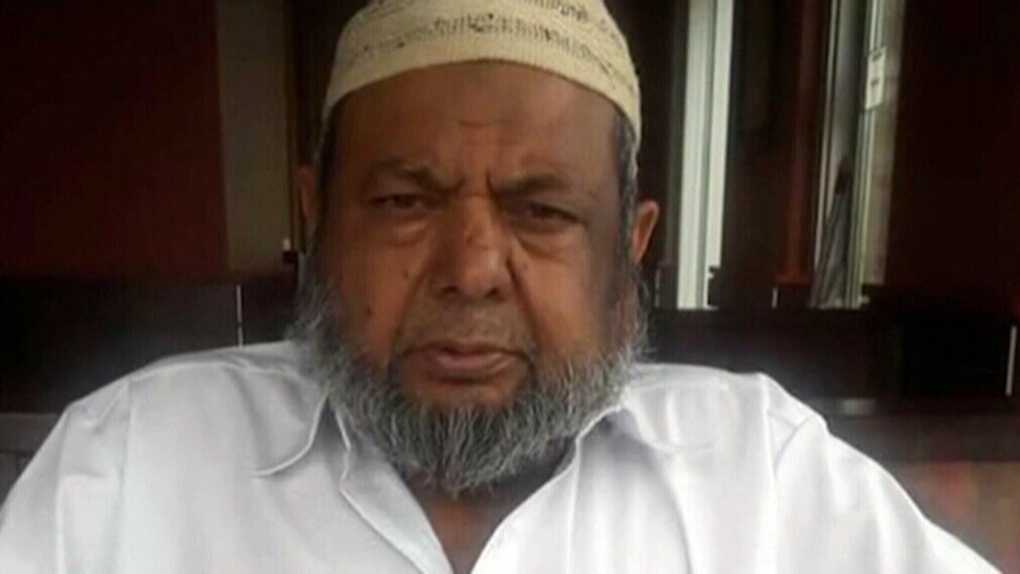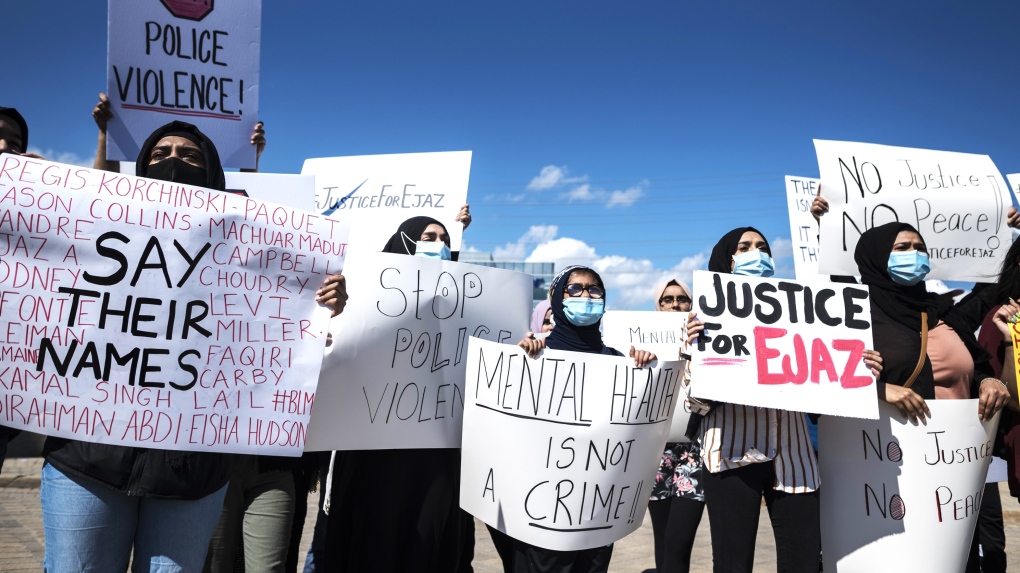Cops involved in Ejaz Choudry's death fail to justify anonymity order with evidence of risk, lawyer argues
The five officers involved in the shooting death of Ejaz Choudry have failed to provide the evidence needed to cast aside open court principles and justify shielding their identities from the public, lawyers representing Choudry's family argued at a Tuesday hearing.
Choudry, who had schizophrenia, was fatally shot by police inside his Mississauga apartment on the evening of June 20, 2020. Officers arrived at the residence at around 5 p.m. after his daughter called for paramedics, according to court filings. He had not taken his medication, she reported, and was experiencing a mental health crisis.
- Download our app to get local alerts on your device
- Get the latest local updates right to your inbox
At around 8 p.m., Choudry, still inside the unit, had stopped responding to officers. They then breached the home, two climbing in over the balcony. Within seconds, officers Tasered, fired rubber projectiles, and shot two bullets at Choudry, killing him.

Two of the officers in the room later told investigators with Ontario's Special Investigations Unit (SIU) – a provincial arms-length agency that investigates police interactions resulting in serious injury, death, or allegations of sexual assault – that Choudry had moved at them with a knife after they entered the home.
In 2021, the SIU found no reasonable grounds to charge any of the officers with criminal offences and cleared all five, a decision that was met with protests across the city.
With no avenue to lay criminal charges, Choudry's family launched a multi-million-dollar civil lawsuit against Peel Regional Police, its chief, and five unnamed officers in 2022, alleging they turned a "straightforward mental health call" into a "high-risk tactical operation" that resulted in the father of four's death. It is these civil proceedings, and the subsequent public court records produced, in which police have requested their identities be protected under a publication ban and anonymity order, arguing that the public's response to the events has left them fearful for their safety.
Ted Key, representing the officers at Tuesday's hearing, told the court that, at some of the protests that came in the wake of Choudry's death, participants displayed 'Wanted' posters featuring the image of Peel Police Chief Nishan Duraiappah and calling officers involved in civilian deaths' murderers.'
To see such posters "evoked thoughts of the American Wild West" within the officers, according to Key. "It's lawlessness, it's vigilante justice," he told the court.
 People hold signs outside Peel Regional Police Headquarters during a justice rally for Ejaz Choudry, a 62-year-old man who was shot and killed by police, in Mississauga, Ont., on Saturday, June 27, 2020. THE CANADIAN PRESS/ Tijana Martin
People hold signs outside Peel Regional Police Headquarters during a justice rally for Ejaz Choudry, a 62-year-old man who was shot and killed by police, in Mississauga, Ont., on Saturday, June 27, 2020. THE CANADIAN PRESS/ Tijana Martin
At a different protest, one participant said they would "blow up a police station uni-bomber style" if anything happened to their family member at the hands of police. In another instance, a civilian told an officer he was a "marked man."
None of these incidents directly targeted the officers involved in the death of Choudry, as they had not yet been identified. But the officers wrote in affidavits that the conduct, along with the formation of community groups calling for their identities to be revealed, left them feeling fearful and threatened.
The one example provided Tuesday, which included conduct specifically targeting the involved officers, was a video shared on social media months after the incident. In it, a civilian threatened to release one of the officers' addresses and called for the public to "deal with him," Key told the court. Police investigated this threat and found it to be unsubstantiated.
The lawyer said the overall actions of the protestors, both direct and indirect, contributed to the climate of fear experienced by the officers and that their right to safety outweighed the public's right to open court documents. The Police Association of Ontario, granted intervenor status in the case, argued in part that protecting officers' mental health by concealing their identities would serve to lessen the psychological impact of reliving the event.
In his submissions, Simon Beiber, representing the Choudry family, pointed to a portion of the evidence submitted on behalf of the officers drawn from an internal police threat assessment report, arguing it did not meet the threshold to grant them anonymity.
Beiber argued that the report, authored by an officer in Peel police's intelligence unit who had not been present at any of the protests during which the interactions took place, had been crafted with "cherry-picked" accounts of officers who were present.
Ultimately, the report was unable to come to a conclusion on the risk to the officers if their identities were to become public.
"There is not a lick of evidence that anything of all has come of [the conduct of protestors]," he said. "If there had, the officers or police would tell [Justice Perell] about it, but it's been four years and nothing, nothing at all has come of it."
Beiber also suggested the report's inconclusive finding rendered it useless for the court's decision and that the evidence within it, much of which had not been submitted by the officers themselves, should not be considered by the judge.
Granted intervener status back in November, the Canadian Civil Liberties Association (CCLA), the Canadian Muslim Lawyers Association (CMLA), and the Canadian Broadcasting Corporation (CBC) also gave submissions arguing the officers be named in the lawsuit.
"The legitimacy of the court depends on its openness," Zain Naqi, counsel with CMLA, said during the association's submissions.
"There is a real risk that justice goes unserved in this case and I'm asking the court to be alive to that risk."
In its filings, the CCLA argued that an anonymity order should only be granted in exceptional circumstances where the benefits – in this case, protecting a serious risk to personal safety – outweigh the negative impacts of restricting court openness and that the officers' evidence did not meet that threshold.
Justice Perell's decision is expected in the coming weeks.
CTVNews.ca Top Stories

Police arrest Toronto woman in connection with three recent homicides
Police have arrested a Toronto woman in connection with three recent homicides and investigators say that they believe two of the victims may have been 'randomly targeted.'
Following child's death in Ontario, here's what you need to know about rabies
An Ontario child died last month after coming into contact with a rabid bat in their bedroom, which was the first known human rabies case in Canada since 2019.
NDP house leader laments 'agents of chaos' in precarious Parliament
NDP House leader Peter Julian says there's more his party wants to do in Parliament before the next election, but if the current dysfunction continues it will become a factor in how they vote on a confidence measure.
Former Colorado county clerk Tina Peters sentenced to 9 years for voting data scheme
A judge ripped into a Colorado county clerk for her crimes and lies before sentencing her Thursday to nine years behind bars for a data-breach scheme spawned from the rampant false claims about voting machine fraud in the 2020 presidential race.
Here's what the jury didn't hear in Jacob Hoggard's sexual assault trial
A northeastern Ontario jury has started deliberating in Canadian musician Jacob Hoggard's sexual assault trial, we can now tell you what they weren't allowed to hear.
Youth pleads guilty to manslaughter in death of P.E.I. teen Tyson MacDonald
A teen charged with the murder of another teen on Prince Edward Island last year has pleaded guilty to a lesser charge of manslaughter.
A French judge in a shocking rape case allows the public to see some of the video evidence
A French judge in the trial of dozens of men accused of raping an unconscious woman whose now former husband had repeatedly drugged her so that he and others could assault her decided on Friday to allow the public to see some of the video recordings of the alleged rapes.
2 dead after fire rips through historic building in Old Montreal
At least two people are dead and others are injured after a fire ripped through a century-old building in Old Montreal early Friday morning, sources told Noovo Info.
Scientists looked at images from space to see how fast Antarctica is turning green. Here's what they found
Parts of icy Antarctica are turning green with plant life at an alarming rate as the region is gripped by extreme heat events, according to new research, sparking concerns about the changing landscape on this vast continent.
































